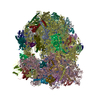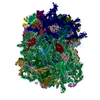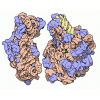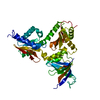[English] 日本語
 Yorodumi
Yorodumi- EMDB-1812: Yeast 80S ribosome stalled by a stem-loop containing mRNA in comp... -
+ Open data
Open data
- Basic information
Basic information
| Entry | Database: EMDB / ID: EMD-1812 | |||||||||
|---|---|---|---|---|---|---|---|---|---|---|
| Title | Yeast 80S ribosome stalled by a stem-loop containing mRNA in complex with Dom34-Hbs1. The dataset is computationally sorted for absence of P-site tRNA and the presence of Dom34-Hbs1 complex. | |||||||||
 Map data Map data | This is cryo-EM 3D reconstruction of a yeast 80S ribosome stalled by a stable stem-loop mRNA structure in complex with Dom34 and Hbs1. This 3D volume does NOT contain P-site tRNA. | |||||||||
 Sample Sample |
| |||||||||
 Keywords Keywords |  ribosome / ribosome /  stalling / stalling /  mRNA / P-site tRNA / no-go mRNA decay mRNA / P-site tRNA / no-go mRNA decay | |||||||||
| Biological species |   Saccharomyces cerevisiae (brewer's yeast) Saccharomyces cerevisiae (brewer's yeast) | |||||||||
| Method |  single particle reconstruction / single particle reconstruction /  cryo EM / Resolution: 9.4 Å cryo EM / Resolution: 9.4 Å | |||||||||
 Authors Authors | Becker T / Armache JP / Anger AM / Jarasch A / Villa E / Sieber H / AbdelMotaal B / Berninghausen O / Mielke T / Beckmann R | |||||||||
 Citation Citation |  Journal: Nat Struct Mol Biol / Year: 2011 Journal: Nat Struct Mol Biol / Year: 2011Title: Structure of the no-go mRNA decay complex Dom34-Hbs1 bound to a stalled 80S ribosome. Authors: Thomas Becker / Jean-Paul Armache / Alexander Jarasch / Andreas M Anger / Elizabeth Villa / Heidemarie Sieber / Basma Abdel Motaal / Thorsten Mielke / Otto Berninghausen / Roland Beckmann /  Abstract: No-go decay (NGD) is a mRNA quality-control mechanism in eukaryotic cells that leads to degradation of mRNAs stalled during translational elongation. The key factors triggering NGD are Dom34 and Hbs1. ...No-go decay (NGD) is a mRNA quality-control mechanism in eukaryotic cells that leads to degradation of mRNAs stalled during translational elongation. The key factors triggering NGD are Dom34 and Hbs1. We used cryo-EM to visualize NGD intermediates resulting from binding of the Dom34-Hbs1 complex to stalled ribosomes. At subnanometer resolution, all domains of Dom34 and Hbs1 were identified, allowing the docking of crystal structures and homology models. Moreover, the close structural similarity of Dom34 and Hbs1 to eukaryotic release factors (eRFs) enabled us to propose a model for the ribosome-bound eRF1-eRF3 complex. Collectively, our data provide structural insights into how stalled mRNA is recognized on the ribosome and how the eRF complex can simultaneously recognize stop codons and catalyze peptide release. | |||||||||
| History |
|
- Structure visualization
Structure visualization
| Movie |
 Movie viewer Movie viewer |
|---|---|
| Structure viewer | EM map:  SurfView SurfView Molmil Molmil Jmol/JSmol Jmol/JSmol |
| Supplemental images |
- Downloads & links
Downloads & links
-EMDB archive
| Map data |  emd_1812.map.gz emd_1812.map.gz | 29.7 MB |  EMDB map data format EMDB map data format | |
|---|---|---|---|---|
| Header (meta data) |  emd-1812-v30.xml emd-1812-v30.xml emd-1812.xml emd-1812.xml | 13.7 KB 13.7 KB | Display Display |  EMDB header EMDB header |
| Images |  EMD-1812.gif EMD-1812.gif | 132.2 KB | ||
| Archive directory |  http://ftp.pdbj.org/pub/emdb/structures/EMD-1812 http://ftp.pdbj.org/pub/emdb/structures/EMD-1812 ftp://ftp.pdbj.org/pub/emdb/structures/EMD-1812 ftp://ftp.pdbj.org/pub/emdb/structures/EMD-1812 | HTTPS FTP |
-Related structure data
- Links
Links
| EMDB pages |  EMDB (EBI/PDBe) / EMDB (EBI/PDBe) /  EMDataResource EMDataResource |
|---|---|
| Related items in Molecule of the Month |
- Map
Map
| File |  Download / File: emd_1812.map.gz / Format: CCP4 / Size: 185.7 MB / Type: IMAGE STORED AS FLOATING POINT NUMBER (4 BYTES) Download / File: emd_1812.map.gz / Format: CCP4 / Size: 185.7 MB / Type: IMAGE STORED AS FLOATING POINT NUMBER (4 BYTES) | ||||||||||||||||||||||||||||||||||||||||||||||||||||||||||||||||||||
|---|---|---|---|---|---|---|---|---|---|---|---|---|---|---|---|---|---|---|---|---|---|---|---|---|---|---|---|---|---|---|---|---|---|---|---|---|---|---|---|---|---|---|---|---|---|---|---|---|---|---|---|---|---|---|---|---|---|---|---|---|---|---|---|---|---|---|---|---|---|
| Annotation | This is cryo-EM 3D reconstruction of a yeast 80S ribosome stalled by a stable stem-loop mRNA structure in complex with Dom34 and Hbs1. This 3D volume does NOT contain P-site tRNA. | ||||||||||||||||||||||||||||||||||||||||||||||||||||||||||||||||||||
| Voxel size | X=Y=Z: 1.2375 Å | ||||||||||||||||||||||||||||||||||||||||||||||||||||||||||||||||||||
| Density |
| ||||||||||||||||||||||||||||||||||||||||||||||||||||||||||||||||||||
| Symmetry | Space group: 1 | ||||||||||||||||||||||||||||||||||||||||||||||||||||||||||||||||||||
| Details | EMDB XML:
CCP4 map header:
| ||||||||||||||||||||||||||||||||||||||||||||||||||||||||||||||||||||
-Supplemental data
- Sample components
Sample components
-Entire : Stem-loop stalled yeast 80S ribosome in complex with Dom34-Hbs1 w...
| Entire | Name: Stem-loop stalled yeast 80S ribosome in complex with Dom34-Hbs1 without P-site tRNA. |
|---|---|
| Components |
|
-Supramolecule #1000: Stem-loop stalled yeast 80S ribosome in complex with Dom34-Hbs1 w...
| Supramolecule | Name: Stem-loop stalled yeast 80S ribosome in complex with Dom34-Hbs1 without P-site tRNA. type: sample / ID: 1000 Details: Mammalian Sec61 was added to saturate the hydrophobic signal sequence present in the nascent polypeptide chain. Oligomeric state: one ribosome / Number unique components: 3 |
|---|---|
| Molecular weight | Theoretical: 3.3 MDa |
-Supramolecule #1: Saccharomyces cerevisiae 80S ribosome
| Supramolecule | Name: Saccharomyces cerevisiae 80S ribosome / type: complex / ID: 1 / Name.synonym: Yeast 80S ribosome Details: The mRNA stem-loop structure is not visible in the Cryo-EM reconstruction indicating its flexibility Ribosome-details: ribosome-eukaryote: ALL |
|---|---|
| Molecular weight | Experimental: 3.2 MDa / Theoretical: 3.2 MDa |
-Macromolecule #1: Hbs1p
| Macromolecule | Name: Hbs1p / type: protein_or_peptide / ID: 1 / Name.synonym: Hbs1p / Number of copies: 1 / Oligomeric state: Monomer / Recombinant expression: Yes |
|---|---|
| Source (natural) | Organism:   Saccharomyces cerevisiae (brewer's yeast) / synonym: Bakers' yeast / Location in cell: cytosol Saccharomyces cerevisiae (brewer's yeast) / synonym: Bakers' yeast / Location in cell: cytosol |
| Molecular weight | Experimental: 68 KDa / Theoretical: 68 KDa |
| Recombinant expression | Organism:   Escherichia coli (E. coli) / Recombinant plasmid: pET28b Escherichia coli (E. coli) / Recombinant plasmid: pET28b |
-Macromolecule #2: Dom34p
| Macromolecule | Name: Dom34p / type: protein_or_peptide / ID: 2 / Name.synonym: Dom34p / Number of copies: 1 / Oligomeric state: Monomer / Recombinant expression: Yes |
|---|---|
| Source (natural) | Organism:   Saccharomyces cerevisiae (brewer's yeast) / synonym: Bakers' yeast / Location in cell: cytosol Saccharomyces cerevisiae (brewer's yeast) / synonym: Bakers' yeast / Location in cell: cytosol |
| Molecular weight | Experimental: 44 KDa / Theoretical: 44 KDa |
| Recombinant expression | Organism:   Escherichia coli (E. coli) / Recombinant plasmid: pET21a Escherichia coli (E. coli) / Recombinant plasmid: pET21a |
-Experimental details
-Structure determination
| Method |  cryo EM cryo EM |
|---|---|
 Processing Processing |  single particle reconstruction single particle reconstruction |
| Aggregation state | particle |
- Sample preparation
Sample preparation
| Concentration | 0.02 mg/mL |
|---|---|
| Buffer | pH: 7 Details: 20 mM Tris/HCl, pH 7.0, 80 mM NaCl, 97 mM KOAc, 10 mM Mg(OAc)2, 1.5 mM DTT, 0.02 % Nikkol, 1.8 % Glycerol, 0.01 mg/ml Cycloheximide, 500 0.5 mM GDPNP, 0.3 % Digitonin |
| Grid | Details: Quantifoil Grid with 2 nm carbon on top |
| Vitrification | Cryogen name: ETHANE / Chamber humidity: 100 % / Instrument: OTHER / Details: Vitrification instrument: Vitrobot Method: Blotted for 10 seconds before plunging, used 2 layer of filter paper |
- Electron microscopy
Electron microscopy
| Microscope | FEI POLARA 300 |
|---|---|
| Electron beam | Acceleration voltage: 300 kV / Electron source:  FIELD EMISSION GUN FIELD EMISSION GUN |
| Electron optics | Calibrated magnification: 38000 / Illumination mode: FLOOD BEAM / Imaging mode: BRIGHT FIELD Bright-field microscopy / Cs: 2.26 mm / Nominal defocus max: 3.78 µm / Nominal defocus min: 1.5 µm / Nominal magnification: 39000 Bright-field microscopy / Cs: 2.26 mm / Nominal defocus max: 3.78 µm / Nominal defocus min: 1.5 µm / Nominal magnification: 39000 |
| Sample stage | Specimen holder: FEI Polara Cartridge System / Specimen holder model: OTHER |
| Temperature | Average: 84 K |
| Alignment procedure | Legacy - Astigmatism: Objective lens astigmatism was corrected at 100000 times magnification |
| Image recording | Category: CCD / Film or detector model: KODAK SO-163 FILM / Digitization - Sampling interval: 4.76 µm / Number real images: 78 / Average electron dose: 25 e/Å2 Details: Scanned with a Heidelberg PrimeScan drum scanner at 5334 dpi Od range: 1.2 / Bits/pixel: 16 |
| Experimental equipment | 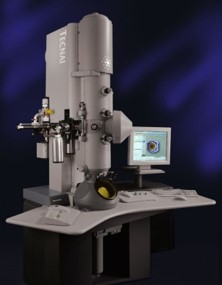 Model: Tecnai Polara / Image courtesy: FEI Company |
- Image processing
Image processing
| CTF correction | Details: CTF correction on the level of 3D volumes (SPIDER TF CTS command) |
|---|---|
| Final reconstruction | Applied symmetry - Point group: C1 (asymmetric) / Algorithm: OTHER / Resolution.type: BY AUTHOR / Resolution: 9.4 Å / Resolution method: FSC 0.5 CUT-OFF / Software - Name: SPIDER Details: The dataset was sorted according to presence of Dom34-Hbs1 complex and absence of P-site tRNA. Number images used: 38400 |
| Details | Mammalian Sec61 complex was added to the sample to saturate the hydrophobic nascent chain |
-Atomic model buiding 1
| Initial model | PDB ID: Chain - Chain ID: A |
|---|---|
| Software | Name: Molecular Dynamics based flexible fitting MDFF |
| Details | PDBEntryID_givenInChain. Rigid body fitting of individual domains using Coot followed by MDFF |
| Refinement | Space: REAL / Protocol: FLEXIBLE FIT |
-Atomic model buiding 2
| Initial model | PDB ID: |
|---|---|
| Software | Name: Molecular Dynamics based flexible fitting MDFF |
| Details | Rigid body fitting of individual domains using Coot followed by MDFF |
| Refinement | Space: REAL / Protocol: FLEXIBLE FIT |
 Movie
Movie Controller
Controller












